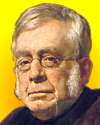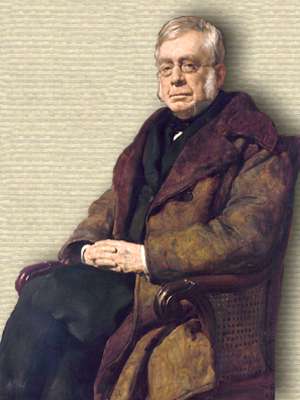 (source)
(source)
|
Sir George Biddell Airy
(27 Jul 1801 - 2 Jan 1892)
English astronomer and mathematician who was the seventh Astronomer Royal. He made a mathematical study of the rainbow, researched optical interference fringes. Airy computed the density of the Earth by swinging a pendulum at a deep mine. He determined the mass of Jupiter, its rotational period and orbits of comets.
|
Science Quotes by Sir George Biddell Airy (5 quotes)
I had made considerable advance ... in calculations on my favourite numerical lunar theory, when I discovered that, under the heavy pressure of unusual matters (two transits of Venus and some eclipses) I had committed a grievous error in the first stage of giving numerical value to my theory. My spirit in the work was broken, and I have never heartily proceeded with it since.
[Concerning his calculations on the orbital motion of the Moon.]
[Concerning his calculations on the orbital motion of the Moon.]
— Sir George Biddell Airy
Private note (29 Sep 1890). In George Biddell Airy and Wilfrid Airy (ed.), Autobiography of Sir George Biddell Airy (1896), 350.
In the hands of Science and indomitable energy, results the most gigantic and absorbing may be wrought out by skilful combinations of acknowledged data and the simplest means.
— Sir George Biddell Airy
From Introduction to Lecture on the Pendulum-Experiments at Harton Pit (1855), iv. The quote comes from the printed Introduction in the published booklet, but was not part of the printed lecture itself. At the request of a “deputation of gentlemen of South Shields,” the printed version of the lecture was written “in extenso, from memory,” after the original talk was given on 24 Oct 1854 at South Shields, County Durham, England.
On Sept 15th [1852] Mr Goulburn, Chancellor of the Exchequer, asked my opinion on the utility of Mr Babbage's calculating machine, and the propriety of spending further sums of money on it. I replied, entering fully into the matter, and giving my opinion that it was worthless.
— Sir George Biddell Airy
In George Biddell Airy and Wilfrid Airy (ed.), Autobiography of Sir George Biddell Airy (1896), 152.
Science [knowledge] which is…obtained by personal observations is vastly superior (as far as it goes) to that which is obtained by any other method. The knowledge derived from Lectures is exceedingly imperfect: that derived from careful reading is admirable for its accuracy and fulness, but occupies the mind rather as a train of internal ideas than as a series of consequences deduced from the observations of nature: but that inferred from actual personal observation carries with it a degree of reality and certainty, as the veritable science of external objects, which nothing else can give.
— Sir George Biddell Airy
In 'Introduction' to Popular Astronomy: A Series of Lectures Delivered at Ipswich (5th ed., 1866), ix.
The measure of the Moon’s distance involves no principle more abstruse than the measure of the distance of a tree on the opposite bank of a river. The principles of construction of the best Astronomical instruments are as simple and as closely referred to matters of common school-education and familiar experience, as are those of the common globes, the steam-engine, or the turning-lathe; the details are usually less complicated.
— Sir George Biddell Airy
In 'Introduction' to Popular Astronomy: A Series of Lectures Delivered at Ipswich (5th ed., 1866), viii.
See also:
- 27 Jul - short biography, births, deaths and events on date of Airy's birth.
- Sir George Biddell Airy - Lecture on the Pendulum Experiments at Harton Pit (1854)

 In science it often happens that scientists say, 'You know that's a really good argument; my position is mistaken,' and then they would actually change their minds and you never hear that old view from them again. They really do it. It doesn't happen as often as it should, because scientists are human and change is sometimes painful. But it happens every day. I cannot recall the last time something like that happened in politics or religion.
(1987) --
In science it often happens that scientists say, 'You know that's a really good argument; my position is mistaken,' and then they would actually change their minds and you never hear that old view from them again. They really do it. It doesn't happen as often as it should, because scientists are human and change is sometimes painful. But it happens every day. I cannot recall the last time something like that happened in politics or religion.
(1987) -- 


